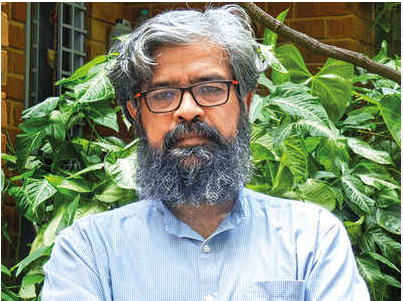HIGHLIGHTS
-
The well-diggers have cleaned, deepened, dug new ones, and revived at least 10,000 open wells in the city
-
These wells provide water for homes, institutions, industries and parks
-
Close to 1,00,000 recharge wells (they replenish groundwater with rainwater) would have been dug to recharge rainwater from rooftops and stormwater drains

Vishwanath Srikantaiah
Leonardo Di Caprio says “only rain can save Chennai.” Water activist and urban planner Vishwanath Srikantaiah adds to it: reviving water bodies, growing water-efficient crops and recycling waste water are ways to ensure such a crisis never repeats in future. He tells Shobita Dhar how to be water wise:
Chennai’s water crisis has made global news but one good monsoon and it will probably all be forgotten. Why is water never a poll issue?
Water is not a poll issue because other issues are manufactured before polls. In most cases, water is a local problem with a need for a local solution. Water is a state subject and has to be managed by states. It will increasingly become a state election issue if articulated well by contestants and manifestos. In some constituencies of my state Karnataka, MLSs who have done good work in bringing water have won on the basis of teir work. Others have lost too, even though they have desilted many tanks.
Can we rely on the government to fix our water problems or should individuals do their bit? Name some places where individuals have made a difference.
It takes individuals, community, the market and the government to make water sustainable and available to all. Dr Sekar Raghavan in Chennai, with his Rain Centre, and Indukanth Ragade have spearheaded the rainwater harvesting movement there. Piyush Manush has single-handledly cleaned up lakes in Salem, Tamil Nadu. Popatrao Pawar has done remarkable work in Hivre Bazar, bringing water security to the whole village. There are many such individuals doing good work in India. Yet in cities, it will take well-functioning institutions to deliver water for all.
Shouldn’t there be a more comprehensive look at water use with proper data?
We need river basin institutions which determine water and availability and demand at a river basin level and based on rainfall help decide which crops cn be We need river basin institutions which determine water and availbility and demand at a river basin level and based on rainfall help decide which crops can be grown. We need incenties, such as what the government of Karnataka is providing, to grow millets. There must be remunerative proces offered, such as a minimum support price for water-efficient crops and a disincentive for water-guzzling crops such a paddy and sugarcane or even banana. Institutions such a the Karnataka Natural Disaster Monitoring Centre, which provide real-time data on rainfall, reservoir and groundwater levels, should be established in every state.
You launched A Million Recharge Wells project in Bangaluru last year. Under this, traditional well-diggers are reviving the city’s open wells. What has been the impact?
The well-diggers have cleaned, deepened, dug new ones, and revived at least 10,000 open wells in the city. These wells provide water for homes, institutions, industries and parks. We estimate that close to 1,00,000 recharge wells (they replenish groundwater with rainwater) would have been dug to recharge rainwater from rooftops and stormwater drains. The impact has been positive on the well-diggers and their livelihood opportunities have increased, but a lot more needs to be done. Success stories such as that of the Wheel and Axle Plant, Yelahanka; Cubbon Park; Rainbow Drive with its 300 reharge wells; and IIM with 65 recharge wells have helped in spreading the word.
Instead of big dams and digging deeper borewells, should the focus be on reviving traditional water bodies?
The era of big dams and deep borewells is over. Deep borewells remove fossil water and that has been exhausted in many areas of the country. We need to move to traditional water bodies plus shallow wells from aquifers which can be annually replenished. By harvesting rain, by increasing organic carbon in soil to make it more moisture retentive, by shifting to good agricultural practices, by recycling wastewater and being very efficient with water use, we can move towards avertiing a crisis of monumental proportions in an era of climate change and variable rainfall.
Which global city has a good water management programme that Indian cities can learn from?
Singapore with its ‘four taps’ approach is an ideal city to follow. The four taps are outside water (from Malaysia), local catchments which harvest rainwater, desalination of sea water and recycling of wastewater. Every Indian city has a least three taps. Coastal cities have the fourth tap as an option. Inland cities have groundwater instead of desalination as the fourth tap. Every city should draw up a plan to use these taps effectively and efficiently. Singapore has another, more significant, factor and that is an excellent water and sanitation institution in the Public Utility Board or PUB. PUB is excellently staffed. It has the capacities for design and managing execution of large-scale infrastructure projects, has the finances to ensure capital expenditure and operations and maintenance expenditure, meters every water connection, has 100% coverage of water and sanitation, picks up and treats every drop of sewage, works on ecological restoration of its waterways, canals and lakes. We must build the governance and institutional capabilities for an urban water management system. The rest will follow.
First published by Times of India on 1 Jul. 2019
Read an earlier article on the subject Needed: a million recharge wells
Read a more recent article Bengaluru: City of a thousand lakes, once more